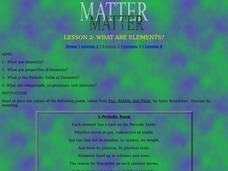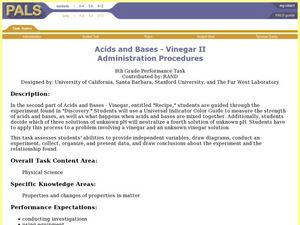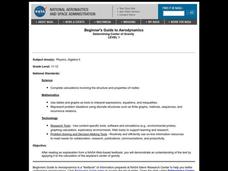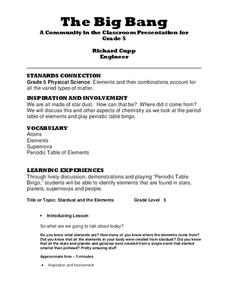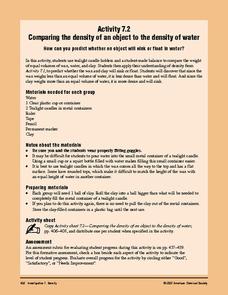Curated OER
Living and Nonliving Things
Students photograph five objects from a bag and five objects from the outdoors. Students categorize things by living and non-living and by properties such as color, size, structure and needs. Students draw conclusions about the basic...
Curated OER
What's in the Soil?
Fourth graders examine soil to find its contents, and how much water and air they can measure. In this soil composition lesson, 4th graders perform three experiments and record their results. In one experiment they examine...
Curated OER
What About Cantaloupes?
Second graders investigate the physical properties of cantaloupe using their senses. For this life science lesson, 2nd graders estimate the weight of their sample. They get it's actual weight and compare it with their estimate.
Curated OER
Reaction Reasoning
Third graders experiment with chemical reactions and examine what happens to the atoms when different reactions occur. In this matter lesson students divide into groups and complete a lab experiment.
Curated OER
Liquids Have Differnt Viscosities
Young scholars explore visosity of matter. They run tests of various liquid substances to observe and compare rates of flow of different substances. In addition, they relate viscosity to distance travelled by sample substances.
Curated OER
What Are Elements?
Students investigate elements by by defining scientific terms. In this Periodic Table of Elements lesson, students utilize a glass of water, and powdered fruit drink to perform a lab activity demonstrating properties of certain...
Curated OER
Acids and Bases - Vinegar II
Eighth graders experiment what happens when acids and bases are mixed together. In this acids and bases experimental instructional activity, 8th graders decide which of three solutions of unknown pH will neutralize a fourth solution of...
Curated OER
Water 1: Water and Ice
Students discover the forms water can take. In this hands-on science lesson, students examine how water can change from a solid to a liquid and then back again.
Purdue University
Yucky Water? No Problem!
Young scholars study the process of water filtration in a three-part STEM lesson. After analyzing samples of dirty water, teams design and build their own filtration systems and measure their efficiency.
NOAA
Ocean Layers I
How is it possible for ocean water to have layers? The sixth installment of a 23-part NOAA Enrichment in Marine sciences and Oceanography (NEMO) program investigates factors that cause different water densities to occur. Experiments...
Code.org
Number Systems
Generating a system of shapes. Groups work together to create a number system using three different shapes as symbols. The groups should come up with the rules that generate all the possible permutations of the three shapes.
American Chemical Society
Investigating the Line
Note that this lesson is best paired with the preceding lesson in the unit. In that lesson, elementary physical scientists observed that the color coating of M&Ms® candies do not mix when dissolved off of the chocolate surface. Now...
Beyond Benign
Writing the Principles
What is the difference between chemistry and green chemistry? The first lesson of the 24-part green chemistry series introduces scholars to its 12 principles. The tendency is toward nontoxic materials and sustainability.
American Chemical Society
Density and Sinking and Floating
Keep your class afloat with a hands-on density lesson. The challenging lesson has learners experiment with different materials to compare their densities. They learn that increasing or decreasing the amount of the material doesn't change...
American Chemical Society
Mixing Liquids to Identify an Unknown Liquid
Yellow and blue make green in a colorful lesson on liquid solutions. The seventh installment of a 16-part Inquiry to Action series asks pupils to mix different-colored solutions and record their observations. They then use their...
Curated OER
What Influences Reaction Rate?
Learners study reaction rates, what determines how fast a reaction happens and how the chemical changes occur. In this reactions lesson students complete a lab where they use Alka-Seltzer to observe reaction rate and create a graph...
Curated OER
Solids in Bottles
Students use funnels to put the five solid materials into clear bottles with caps. They observe how the particulate materials look, sound, and move when they shake and roll the bottle. Finally, students write "sound and touch" poetry.
Curated OER
You Light Up My Life: Developing a Scientific Theory for What Fuels a Candle's Flame!
Students examine how candles work and how scientific theories are developed and tested. Students propose hypotheses about what is burning in a candle then perform tests in order to develop their scientific theory. After a teacher...
Curated OER
A Simple Viscosity Test
Fourth graders experiment with the viscosity of different liquids. They use a stopwatch to time the a steel ball as it drops through different liquids.
Curated OER
Spectroscope
Students examine how to apply conservation of energy and properties of matter to a spectroscope. In this energy instructional activity students build their own spectroscope and observe three kinds of spectra.
Curated OER
Determining Center of Gravity
Students complete calculations involving the structure and properties of matter. They engage in a variety of problem solving activities to help them determine the center of gravity.
Curated OER
The Big Bang
Fifth graders relate the elements in the human body to those produced during a supernova. In this space science and chemistry lesson, 5th graders listen to a lecture and view visuals about the big bang. They relate the production of...
American Chemical Society
Change in Temperature - Exothermic Reaction
Alone, or as part of the intended unit on chemical reactions, this activity allows learners to experience an exothermic reaction. Here, learners add calcium chloride to a baking soda solution and watch the temperature rise! They will...
American Chemical Society
Comparing the Density of an Object to the Density of Water
Investigators construct a makeshift balance and compare equal volumes of wax and water. They do the same for clay and water. Then they discover whether the wax and clay will float or sink in water. Ultimately this is a comparison of...
Other popular searches
- Properties of Matter
- Physical Properties of Matter
- Properties of Matter Song
- Useful Properties of Matter
- Science Properties of Matter
- Properties of Matter Booklet
- Properties of Matter Lecture
- Compare Properties of Matter
- Chemical Properties of Matter
- Social Properties of Matter
- Properties of Matter Test
- Intensive Properties Matter





